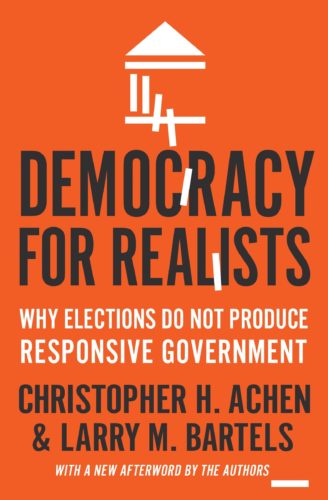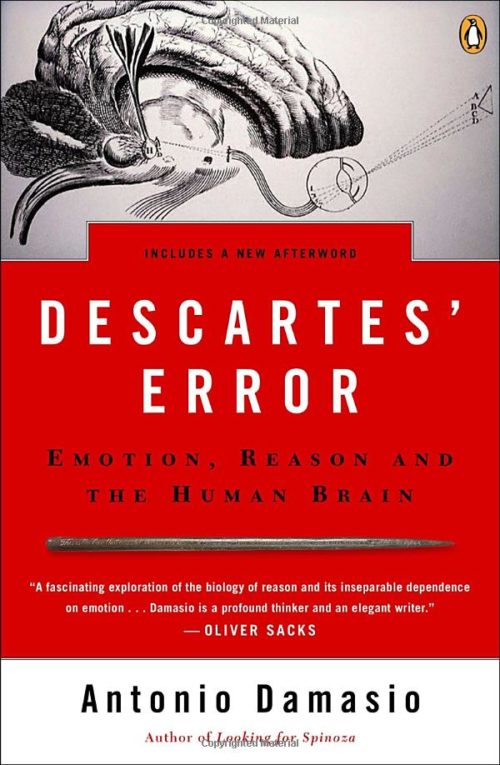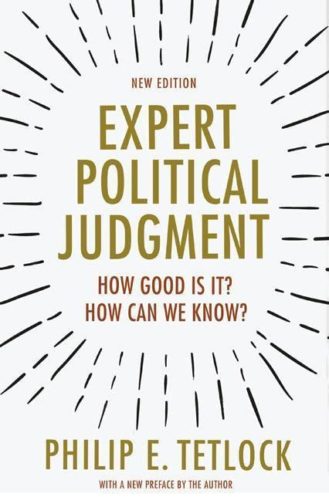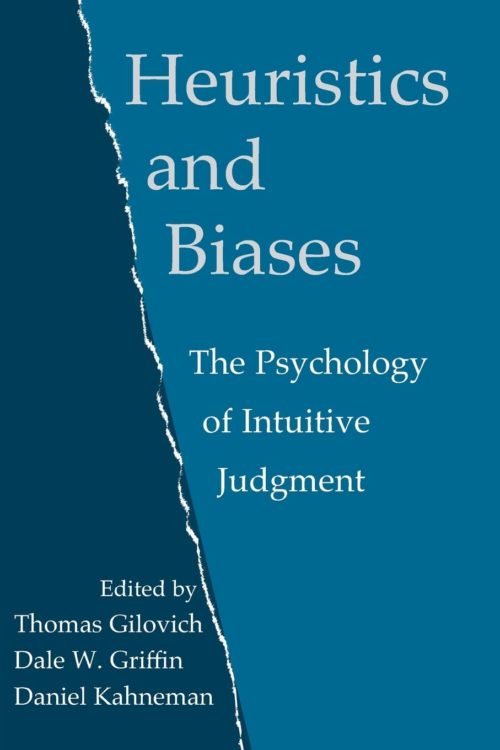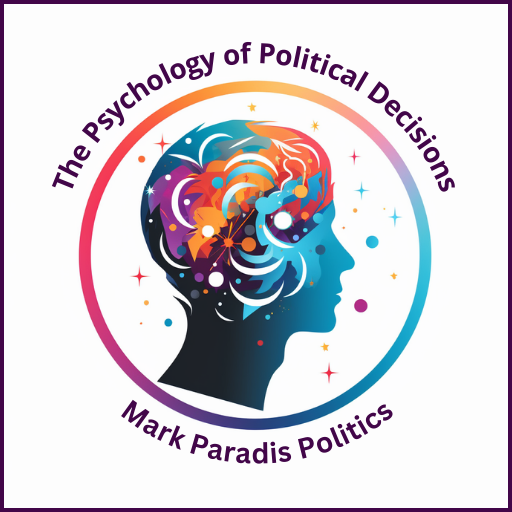Our Brain’s Inner Politician Limits Democratic Accountability: The Human Mind Prioritizes Rationalization Over Truth
- By Mark Paradis
- Published August 21, 2023
- No Comments
Introduction
Human decision-making relies on two distinct systems. The first system (System 1) is an unconscious system that matches incoming signals to existing patterns in our brain and applies simplifying rules of thumb (heuristics) to reach judgments and decisions.1Gilovich, Thomas, Dale Griffin, and Daniel Kahneman, eds. 2002. Heuristics and Biases: The Psychology of Intuitive Judgment. Cambridge, UK: Cambridge University Press.2Haidt, Jonathan. 2012. The Righteous Mind: Why Good People Are Divided by Politics and Religion. New York: Vintage Books.3Kahneman, Daniel. 2011. Thinking, Fast and Slow. New York: Farrar, Straus and Giroux.4Morewedge, Carey K. and Daniel Kahneman. 2010. “Associative Processes in Intuitive Judgment” Trends in Cognitive Sciences. 14 (10): 435-440. https://doi.org/10.1016/j.tics.2010.07.004.5Stanovich, Keith E. 2009. Decision Making and Rationality in the Modern World. Oxford: Oxford University Press. This system is very rapid, and it operates automatically without our awareness. When you have a gut feeling or an intuition, that’s from System 1. The rules that are used within this system have evolved over centuries and they generally produce good judgments and decisions. However, under certain circumstances, it can produce errors (biases). System 2 involves conscious, deliberative thought. It is much slower than System 1. It allows us to examine different options and their consequences, and to (hopefully) make decisions that are in our best interest. While System 2 is the only thought process that we are consciously aware of, System 1 is the system that we use most commonly. Most decisions that we reach on a day-to-day basis rely almost exclusively on unconscious thought. And even when conscious thought is activated, it takes our intuitions as the starting point.
When people first learn that many of their decisions are made unconsciously, they often have two responses. First, they utter something like “I make my own decisions, thank you very much” (sometimes not quite so politely). This is an understandable reaction, but also a bit of a silly one. After all, your unconscious mind is still your mind. You are still making the decision. Your conscious and your unconscious decisions both come from your brain, and both are influenced by your life experiences. Both processes are still you.
Second, they eventually come to the conclusion that System 2 is most likely to be active when faced with an important decision. Sure, System 1 might take over when choosing what to have for breakfast, but for more consequential decisions (sorry to all breakfast enthusiasts), System 2 is likely to take over. Unfortunately, however, it isn’t quite that simple. A fully reasoned, rational decision requires the careful consideration of all facts in an impartial manner. When it comes to System 2, that requirement is not met. System 2 takes the output from System 1 as a starting point.6Kahneman, Daniel. 2011. Thinking, Fast and Slow. New York: Farrar, Straus and Giroux, pages 39-49.7Gilbert, Daniel T. 1989. “Thinking Lightly About Others: Automatic Components of the Social Inference Process.” In Unintended Thought, edited by James S. Uleman and John A. Bargh, 189–211. New York: The Guilford Press.8Moskowitz, Gordon B. and Robert J. 1992. Spontaneous Trait Inferences as Self-Generated Primes: Implications for Conscious Social Judgment. Journal of Personality and Social Psychology 62 (5): 728–738. https://doi.org/10.1037/0022-3514.62.5.728. Our minds are already leaning in a particular direction. Our deliberations will, more often than not, lead us to the same conclusion as our unconscious mind.
A fully reasoned, rational decision also requires that we are seeking truth. That’s the whole idea of a rational mind, right? We want to weigh the available options and choose the one that will best help us achieve our goals. This, however, is not how our conscious mind works. It isn’t a truth seeker.9Haidt, Jonathan. 2012. The Righteous Mind: Why Good People Are Divided by Politics and Religion. New York: Vintage Books.10Lerner, Jennifer S. and Philip E. Tetlock. 1999. “Accounting for the Effects of Accountability.” Psychological Bulletin 125 (2): 255-275. https://doi.org/10.1037/0033-2909.125.2.255.11Lerner, Jennifer S. and Philip E. Tetlock. 2003. “Bridging Individual, Interpersonal, and Institutional Approaches to Judgment and Decision Making: The Impact of Accountability of Cognitive Bias.” In Emerging Perspectives on Judgment and Decision Research, edited by. Sandra L. Schneider and James Shanteau, 431-457. Cambridge, UK: Cambridge University Press.12Tetlock, Philip E. 2002. “Social Functionalist Frameworks for Judgment and Choice: Intuitive Politicians, Theologians, and Prosecutors.” Psychological Review 109 (3): 451-471. https://doi.org/10.1037/0033-295X.109.3.451. It is a lawyer. It is a press secretary. It is a public relations expert. It is a politician. In this article, we will explore the role of our conscious mind as our brain’s inner politician.
Our Brain’s Inner Politician
The standard vision of our rational mind is that our brain functions like a scientist.13Haidt, Jonathan. 2012. The Righteous Mind: Why Good People Are Divided by Politics and Religion. New York: Vintage Books, page 88. We use logic, our experiences, and experimentation to understand the world around us. We believe that our brains are designed to identify reality. However, in the social world, appearance is everything. It matters not what is true, it matters what we can justify.
Why do we care so much about appearance? Humans have evolved to live within communities. Living with a group confers substantial survival benefits. However, to take advantage of these benefits (and for others to benefit from our presence in the group), we need to each contribute to the group. We become dependent on others, and they become dependent on us. In an interdependent society, reciprocity becomes an important norm of behavior.14Tetlock, Philip E. 2002. “Social Functionalist Frameworks for Judgment and Choice: Intuitive Politicians, Theologians, and Prosecutors.” Psychological Review 109 (3): 451-471. https://doi.org/10.1037/0033-295X.109.3.451. We want to make sure that others are contributing to the group as much as we are contributing. If I make a sacrifice for others, I want to know that they will make a sacrifice for me. Cheating poses a threat to members of the group and to group cohesion overall. Therefore, holding others accountable for their actions becomes a key function of successful groups and communities. Accountability is defined as “the implicit or explicit expectation that one will be called upon to justify one’s beliefs, feelings, or actions to others.”15Lerner, Jennifer S. and Philip E. Tetlock. 1999. “Accounting for the Effects of Accountability.” Psychological Bulletin 125 (2): 255-275. https://doi.org/10.1037/0033-2909.125.2.255, page 255. It requires the expectation that unsatisfactory responses will lead to punishment and that compelling responses will produce rewards. If we want to avoid punishment, then we need to care about how we are perceived and be able to manage how we are perceived by others.
Political psychologist Philip Tetlock argues that people act like intuitive politicians who strive “to maintain positive social identities vis-à-vis significant constituencies in their lives.”16Tetlock, Philip E. 2002. “Social Functionalist Frameworks for Judgment and Choice: Intuitive Politicians, Theologians, and Prosecutors.” Psychological Review 109 (3): 451-471. https://doi.org/10.1037/0033-295X.109.3.451, page 452. We care a great deal about what others think of us. While only some people will admit that they care about their status, it affects the self-esteem of everyone. For example, in an experiment, participants were told to speak to an audience about their lives.17Leary, Mark R. 2004. The Curse of the Self: Self-Awareness, Egotism, and the Quality of Human Life. Oxford: Oxford University Press. As they were speaking, the audience gave them feedback on whether they wanted to interact with the person. Imagine speaking to an audience and watching the feedback become more and more negative as you speak. It wouldn’t feel great. You’d probably feel pretty bad about yourself. And this is exactly what the researchers found. Even among participants who claimed not to care about how they were perceived, their self-esteem plummeted as the feedback worsened. We are constantly gathering information to monitor our status within a community.
To help manage our social status within our community, our minds try to anticipate objections to our actions from within our community and to prepare responses that will satisfy their objections.18Haidt, Jonathan. 2012. The Righteous Mind: Why Good People Are Divided by Politics and Religion. New York: Vintage Books.19Lerner, Jennifer S. and Philip E. Tetlock. 1999. “Accounting for the Effects of Accountability.” Psychological Bulletin 125 (2): 255-275. https://doi.org/10.1037/0033-2909.125.2.255.20Lerner, Jennifer S. and Philip E. Tetlock. 2003. “Bridging Individual, Interpersonal, and Institutional Approaches to Judgment and Decision Making: The Impact of Accountability of Cognitive Bias.” In Emerging Perspectives on Judgment and Decision Research, edited by. Sandra L. Schneider and James Shanteau, 431-457. Cambridge, UK: Cambridge University Press.21Tetlock, Philip E. 2002. “Social Functionalist Frameworks for Judgment and Choice: Intuitive Politicians, Theologians, and Prosecutors.” Psychological Review 109 (3): 451-471. https://doi.org/10.1037/0033-295X.109.3.451. If someone is going to challenge us about our behavior, we want a way to be able to justify to them what we have done. Even if we make a mistake or even if they disagree with our decision, we should be able to avoid negative consequences if we can provide a seemingly compelling reason for our actions. We care about what can be “persuasively justified or excused to others” more than we care about the truth.22Lerner, Jennifer S. and Philip E. Tetlock. 2003. “Bridging Individual, Interpersonal, and Institutional Approaches to Judgment and Decision Making: The Impact of Accountability of Cognitive Bias.” In Emerging Perspectives on Judgment and Decision Research, edited by. Sandra L. Schneider and James Shanteau, 431-457. Cambridge, UK: Cambridge University Press, page 433. While this might seem irrational—knowing the truth should be beneficial for survival—it makes sense given the social context in which we live. The balance between truth and justification depends on whether we believe we’ll be held accountable.
Accountability Activates the Inner Scientist, Sometimes
Whether our inner politician or inner scientist takes control of our decisions depends on 1) whether we believe that we’ll be held accountable for our actions, and 2) the characteristics of those who might be judging us. When we believe that we won’t be held accountable, we feel little need to reason further about an issue and we rely on our gut feelings.23Haidt, Jonathan. 2012. The Righteous Mind: Why Good People Are Divided by Politics and Religion. New York: Vintage Books, page 88.24Baron, Jonathan. 2007. Thinking and Deciding, 4th Cambridge, UK: Cambridge University Press.25Tetlock, Philip E. 2002. “Social Functionalist Frameworks for Judgment and Choice: Intuitive Politicians, Theologians, and Prosecutors.” Psychological Review 109 (3): 451-471. https://doi.org/10.1037/0033-295X.109.3.451./mfn] When our unconscious mind leads us to sound judgment, this works fine. However, when our unconscious mind produces biased decisions (i.e., errors), our conscious mind will expend little effort in identifying and correcting those errors. If our primary goal is to maintain our position with the community and our community doesn’t seem to care what we do (or at least they don’t seem inclined to punish us for our negative actions), then why should we care about what we do? If others won’t hold you accountable, then there is little reason to bother holding yourself accountable (maybe that explains why I’m so unproductive when I don’t have an externally-imposed schedule). Conversely, when people know in advance that they are likely to have to justify their judgments and decisions, “they think more systematically and self-critically. They are less likely to jump to premature conclusions and more likely to revise their beliefs in response to evidence.”25Haidt, Jonathan. 2012. The Righteous Mind: Why Good People Are Divided by Politics and Religion. New York: Vintage Books, page 88.
Exploratory thought is a thorough examination of different perspectives on the problem.26Lerner, Jennifer S. and Philip E. Tetlock. 2003. “Bridging Individual, Interpersonal, and Institutional Approaches to Judgment and Decision Making: The Impact of Accountability of Cognitive Bias.” In Emerging Perspectives on Judgment and Decision Research, edited by. Sandra L. Schneider and James Shanteau, 431-457. Cambridge, UK: Cambridge University Press, page 438. This approximates the inner scientist model of decision-making that is most desirable. Rather than trying to bolster our own intuitions, we are carefully examining different viewpoints. However, exploratory thought is only used when 1) a decision-maker knows before reaching their decision that they’ll be held accountable for it, 2) the decision-maker does not know the views of those who will be holding them accountable, and 3) they believe that those holding them accountable are knowledgeable about the issue and care about accuracy. Under those three conditions, decision-makers try to find the truth because that is what is required to maintain social status. The audience wants the truth, so the decision-maker must be able to provide it.
Confirmatory thought is “a one-sided attempt to rationalize a particular point of view.”27Lerner, Jennifer S. and Philip E. Tetlock. 2003. “Bridging Individual, Interpersonal, and Institutional Approaches to Judgment and Decision Making: The Impact of Accountability of Cognitive Bias.” In Emerging Perspectives on Judgment and Decision Research, edited by. Sandra L. Schneider and James Shanteau, 431-457. Cambridge, UK: Cambridge University Press, page 438. In other words, rather than doing a full search for the truth, we look for reasons that are good enough to justify the decisions we have already made. When the three preconditions for exploratory thought do not hold, then even accountability is not sufficient to activate the inner scientist. The reasons are fairly simple. First, if the someone does not know they will be held accountable until after they make a decision, then they were likely making the decision under the assumption that they wouldn’t be held accountable, and, therefore, relied on their intuition. And once they learn that they will be held accountable, the truth does them little use after the fact. Instead, what matters is that they can produce some evidence, any evidence, that can used to demonstrate that their decision was reasonable. They are likely to engage in “defensive bolstering,” a process of spending energy to rationalize past actions.28Lerner, Jennifer S. and Philip E. Tetlock. 1999. “Accounting for the Effects of Accountability.” Psychological Bulletin 125 (2): 255-275. https://doi.org/10.1037/0033-2909.125.2.255, page 258. Searching for confirmatory evidence—evidence that supports their decision—is the best course of action. Decision-makers will try to accumulate as much evidence in support of their actions as possible, and will become closed to any contradictory evidence.
Second, if the decision-maker knows the views of those who will be holding them accountable, then they can simply adopt the views of their audience.29Lerner, Jennifer S. and Philip E. Tetlock. 1999. “Accounting for the Effects of Accountability.” Psychological Bulletin 125 (2): 255-275. https://doi.org/10.1037/0033-2909.125.2.255.30Tetlock, Philip. E., Linda J. Skitka, and Richard Boettger. 1989. “Social and Cognitive Strategies for Coping with Accountability: Conformity, Complexity, and Bolstering.” Journal of Personality and Social Psychology 57 (4): 632-640. https://doi.org/10.1037/0022-3514.57.4.632. They don’t have to care about whether the audience is right, they just have to produce a decision that is agreeable to the audience. Conformity becomes their best defense. This becomes more difficult when the views of the audience are split on the topic. Under those circumstances, decision-makers are likely to engage in “preemptive self-criticism” whereby they spend some effort integrating multiple perspectives so that they can justify their actions to both sides.31Lerner, Jennifer S. and Philip E. Tetlock. 1999. “Accounting for the Effects of Accountability.” Psychological Bulletin 125 (2): 255-275. https://doi.org/10.1037/0033-2909.125.2.255, page 257.
Finally, if the audience is not knowledgeable about the issue and/or if they don’t care about accuracy, then simple justifications based on confirmatory evidence should be sufficient to placate them. If the audience isn’t knowledgeable about the issue, then they will not be in a position to contradict your justifications. If the audience doesn’t care about the truth, then they won’t be motivated to contradict your arguments. This is becoming increasingly common in politics. Neither those who support or oppose a politician really care about the truth.32Bolsen, Toby, James N. Druckman, and Fay Lomax Cook. 2014. “The Influence of Partisan Motivated Reasoning on Public Opinion.” Political Behavior 36 (2): 235-262. https://link.springer.com/article/10.1007/s11109-013-9238-0.33Flynn, D.J., Brendan Nyhan, and Jason Reifler. 2017. “The Nature and Origins of Misperceptions: Understanding False and Unsupported Beliefs About Politics.” Political Psychology 38 (51): 127-150. https://doi.org/10.1111/pops.12394.34Lodge, Milton and Charles S. Taber. 2013. The Rationalizing Voter. Cambridge, UK: Cambridge University Press.35Taber, Charles S. and Milton Lodge. 2006. “Motivated Skepticism in the Evaluation of Political Beliefs.” American Journal of Political Science 50 (3): 755-769. https://doi.org/10.1111/j.1540-5907.2006.00214.x. Those who support the politician will accept any justification. They will consider whether they can accept the justification.36Haidt, Jonathan. 2012. The Righteous Mind: Why Good People Are Divided by Politics and Religion. New York: Vintage Books, pages 97-99. It is usually easy to find a reason to do so. On the other hand, those who oppose the politician won’t accept any rationalization. They will consider whether they must accept the justification. Normally, it is simple to find a reason not to.
When the preconditions for exploratory thought are not present, people try harder “to look right than to be right.”37Haidt, Jonathan. 2012. The Righteous Mind: Why Good People Are Divided by Politics and Religion. New York: Vintage Books, page 89.
Concluding Remarks: Accountability in Democracies
You might be thinking that we don’t have much to worry about in a democracy. After all, aren’t democratic institutions explicitly designed for accountability through multiple checks and balances? And you’d be correct, in theory. However, in practice, the situation is much more complicated. The principal way that the public can hold the government accountable is through free and fair elections. And, in fact, one of the most prominent theories of voting–retrospective voting–is based on the idea that the public votes by evaluating the performance of the government.38Fiorina, Morris P. 1981. Retrospective Voting in American National Elections. New Haven, CT: Yale University Press.39Healy, Andrew and Neil Malhotra. 2013. “Retrospective Voting Reconsidered.” Annual Review of Political Science 16: 285-306. https://doi.org/10.1146/annurev-polisci-032211-212920.40Page, Benjamin I. and Robert Y. Shapiro. 1992. The Rational Public: Fifty Years of Trends in Americans’ Policy Preferences. Chicago: University of Chicago Press. However, there are at least three problems.
First, holding leaders accountable requires knowing what is going on in politics. Studies on political knowledge show us that the public, for the most part, really doesn’t know much or care much about politics.41Althaus, Scott L. 1998. “Information Effects in Collective Preferences.” American Political Science Review 92 (3): 545-558. https://doi.org/10.2307/2585480.42Delli-Carpini, Michael X. and Scott Keeper. 1996. What Americans Know About Politics and Why It Matters. New Haven, CT: Yale University Press.43Gilens, Martin. 2001. “Political Ignorance and Collective Policy Preferences.” American Political Science Review 95 (2): 379-396. https://doi.org/10.1017/S0003055401002222.44Kuklinski, James H., Paul J. Qurik, Jennifer Jerit, David Schwieder, and Robert F. Rich. 2000. “Misinformation and the Currency of Democratic Citizenship.” The Journal of Politics 62 (3): 790-816. https://doi.org/10.1111/0022-3816.00033. And with changes in media technology that allow the public to completely avoid news and media content if they so desire, the situation is likely to only get worse.45Prior, Markus. 2005. “News vs. Entertainment: How Increasing Media Choice Widens Gaps in Political Knowledge and Turnout.” American Political Science Review 49 (3): 577-592. https://doi.org/10.1111/j.1540-5907.2005.00143.x.46Prior, Markus. 2007. Post-Broadcast Democracy: How Media Choice Increases Inequality in Political Involvement and Polarizes Elections. Cambridge, UK: Cambridge University Press.
Second, despite low levels of political knowledge, the public generally does a fairly good job voting as if they were knowledgeable.47Lau, Richard R. and David P. Redlawsk. 1997. “Voting Correctly.” American Political Science Review 91 (3): 585-598. https://doi.org/10.2307/2952076.48Lupia, Arthur and Mathew D. McCubbins. 1998. The Democratic Dilemma: Can Citizens Learn What They Need to Know? Cambridge, UK: Cambridge University Press.49Popkin, Samuel L. 1991. The Reasoning Voter: Communications and Persuasion in Presidential Campaigns. Chicago: University of Chicago Press. They do so by relying on internal cues (e.g., ideology, values) and external cues (e.g., trusted politicians, media sources, and community members). And while this might work well most of the time, it isn’t a particularly effective method for holding leaders accountable. It is unlikely that political leaders, “friendly” media sources, and co-partisans in the community are likely to be particularly forthcoming about failures and scandals. And given the increasingly partisan nature of politics, many in the public will automatically dismiss “unfriendly” opposition, media, and community sources.50Barbera, Pablo, John T. Jost, and Richard Bonneau. 2015. “Tweeting from Left to Right: Is Online Political Communication More Than an Echo Chamber.” Psychological Science 26 (10): 1531-1542. https://doi.org/10.1177/09567976155946.51Dias, Nicholas and Yphtach Leikes. 2022. “The Nature of Affective Polarization: Disentangling Policy Disagreements from Partisan Identity.” American Journal of Political Science 66 (3): 775-790. https://doi.org/10.1111/ajps.12628.52Flynn, D.J., Brendan Nyhan, and Jason Reifler. 2017. “The Nature and Origins of Misperceptions: Understanding False and Unsupported Beliefs About Politics.” Political Psychology 38 (51): 127-150. https://doi.org/10.1111/pops.12394.53Lodge, Milton and Charles S. Taber. 2013. The Rationalizing Voter. Cambridge, UK: Cambridge University Press.54Prior, Markus. 2013. “Media and Political Polarization.” Annual Review of Political Science 16: 101-127. https://doi.org/10.1146/annurev-polisci-100711-135242.55Taber, Charles S. and Milton Lodge. 2006. “Motivated Skepticism in the Evaluation of Political Beliefs.” American Journal of Political Science 50 (3): 755-769. https://doi.org/10.1111/j.1540-5907.2006.00214.x.
Finally, when voting, the public is generally more likely to vote based on ideology, partisanship, and group identity than they are to vote in their individual or family’s self-interest.56Achen, Christopher H. and Larry M. Bartels. 2017. Democracy for Realists: Why Elections Do Not Produce Responsive Government. Princeton, NJ: Princeton University Press.57Chong, Dennis, Jack Citrin, and Patricia Conley. 2001. “When Self-Interest Matters.” Political Psychology 22 (3): 541-570. https://doi.org/10.1111/0162-895X.00253.58Green, Donald, Bradley Palmquist, and Eric Schickler. 2004. Partisan Hearts and Minds: Political Parties and the Social Identities of Voters. New Haven, CT: Yale University Press.59Hainmueller, Jens and Daniel J. Hopkins. 2014. “Public Attitudes Toward Immigration.” Annual Review of Political Science 17: 225-249. https://doi.org/10.1146/annurev-polisci-102512-194818. As we’ve just discussed, voting based on ideology and partisanship isn’t going to be effective from an accountability perspective. Voting based on group identity could potentially be effective, but only if voters are evaluating the performance of the government in helping their group, rather than using group identity as a partisan shortcut (i.e., my group votes for this party, so I’ll vote for this party).
Accountability, then, poses a substantial challenge in modern democracies. The inner politician in a leader’s brain, the actual public relations teams employed by politicians and political parties, and the combination of ideological and partisan voting with the public’s disinterest, means that we are living in a political landscape filled with justifications rather than truth.
And to be honest, we have ourselves to blame. Politicians—all of us really—are more likely to rationalize our judgments and decisions rather than to seek the truth about them unless we believe that we’ll be held accountable. And the very tools needed to hold politicians accountable have been designed in our very democratic institutions, but we don’t use them. We don’t have to believe that what politicians do is right, but we should at least concede that we’d probably do the same in their shoes and that we share some of the blame.
We’ll continue to go deeper into accountability in future articles.
Did you enjoy the article? Consider sharing with your friends.
References
Achen, Christopher H. and Larry M. Bartels. 2017. Democracy for Realists: Why Elections Do Not Produce Responsive Government. Princeton, NJ: Princeton University Press.
Althaus, Scott L. 1998. “Information Effects in Collective Preferences.” American Political Science Review 92 (3): 545-558. https://doi.org/10.2307/2585480.
Barbera, Pablo, John T. Jost, and Richard Bonneau. 2015. “Tweeting from Left to Right: Is Online Political Communication More Than an Echo Chamber.” Psychological Science 26 (10): 1531-1542. https://doi.org/10.1177/09567976155946.
Baron, Jonathan. 2007. Thinking and Deciding, 4th ed. Cambridge, UK: Cambridge University Press.
Bolsen, Toby, James N. Druckman, and Fay Lomax Cook. 2014. “The Influence of Partisan Motivated Reasoning on Public Opinion.” Political Behavior 36 (2): 235-262. https://link.springer.com/article/10.1007/s11109-013-9238-0.
Chong, Dennis, Jack Citrin, and Patricia Conley. 2001. “When Self-Interest Matters.” Political Psychology 22 (3): 541-570. https://doi.org/10.1111/0162-895X.00253.
Delli-Carpini, Michael X. and Scott Keeper. 1996. What Americans Know About Politics and Why It Matters. New Haven, CT: Yale University Press.
Dias, Nicholas and Yphtach Leikes. 2022. “The Nature of Affective Polarization: Disentangling Policy Disagreements from Partisan Identity.” American Journal of Political Science 66 (3): 775-790. https://doi.org/10.1111/ajps.12628.
Fiorina, Morris P. 1981. Retrospective Voting in American National Elections. New Haven, CT: Yale University Press.
Flynn, D.J., Brendan Nyhan, and Jason Reifler. 2017. “The Nature and Origins of Misperceptions: Understanding False and Unsupported Beliefs About Politics.” Political Psychology 38 (51): 127-150. https://doi.org/10.1111/pops.12394.
Gilbert, Daniel T. 1989. “Thinking Lightly About Others: Automatic Components of the Social Inference Process.” In Unintended Thought, edited by James S. Uleman and John A. Bargh, 189–211. New York: The Guilford Press.
Gilens, Martin. 2001. “Political Ignorance and Collective Policy Preferences.” American Political Science Review 95 (2): 379-396. https://doi.org/10.1017/S0003055401002222.
Gilovich, Thomas, Dale Griffin, and Daniel Kahneman, eds. 2002. Heuristics and Biases: The Psychology of Intuitive Judgment. Cambridge, UK: Cambridge University Press.
Green, Donald, Bradley Palmquist, and Eric Schickler. 2004. Partisan Hearts and Minds: Political Parties and the Social Identities of Voters. New Haven, CT: Yale University Press.
Haidt, Jonathan. 2012. The Righteous Mind: Why Good People Are Divided by Politics and Religion. New York: Vintage Books.
Hainmueller, Jens and Daniel J. Hopkins. 2014. “Public Attitudes Toward Immigration.” Annual Review of Political Science 17: 225-249. https://doi.org/10.1146/annurev-polisci-102512-194818.
Healy, Andrew and Neil Malhotra. 2013. “Retrospective Voting Reconsidered.” Annual Review of Political Science 16: 285-306. https://doi.org/10.1146/annurev-polisci-032211-212920.
Kahneman, Daniel. 2011. Thinking, Fast and Slow. New York: Farrar, Straus and Giroux.
Kuklinski, James H., Paul J. Qurik, Jennifer Jerit, David Schwieder, and Robert F. Rich. 2000. “Misinformation and the Currency of Democratic Citizenship.” The Journal of Politics 62 (3): 790-816. https://doi.org/10.1111/0022-3816.00033.
Lau, Richard R. and David P. Redlawsk. 1997. “Voting Correctly.” American Political Science Review 91 (3): 585-598. https://doi.org/10.2307/2952076.
Leary, Mark R. 2004. The Curse of the Self: Self-Awareness, Egotism, and the Quality of Human Life. Oxford: Oxford University Press.
Lerner, Jennifer S. and Philip E. Tetlock. 1999. “Accounting for the Effects of Accountability.” Psychological Bulletin 125 (2): 255-275. https://doi.org/10.1037/0033-2909.125.2.255.
Lerner, Jennifer S. and Philip E. Tetlock. 2003. “Bridging Individual, Interpersonal, and Institutional Approaches to Judgment and Decision Making: The Impact of Accountability of Cognitive Bias.” In Emerging Perspectives on Judgment and Decision Research, edited by. Sandra L. Schneider and James Shanteau, 431-457. Cambridge, UK: Cambridge University Press.
Lodge, Milton and Charles S. Taber. 2013. The Rationalizing Voter. Cambridge, UK: Cambridge University Press.
Lupia, Arthur and Mathew D. McCubbins. 1998. The Democratic Dilemma: Can Citizens Learn What They Need to Know? Cambridge, UK: Cambridge University Press.
Morewedge, Carey K. and Daniel Kahneman. 2010. “Associative Processes in Intuitive Judgment” Trends in Cognitive Sciences. 14 (10): 435-440. https://doi.org/10.1016/j.tics.2010.07.004.
Moskowitz, Gordon B. and Robert J. 1992. Spontaneous Trait Inferences as Self-Generated Primes: Implications for Conscious Social Judgment. Journal of Personality and Social Psychology 62 (5): 728–738. https://doi.org/10.1037/0022-3514.62.5.728.
Page, Benjamin I. and Robert Y. Shapiro. 1992. The Rational Public: Fifty Years of Trends in Americans’ Policy Preferences. Chicago: University of Chicago Press.
Popkin, Samuel L. 1991. The Reasoning Voter: Communications and Persuasion in Presidential Campaigns. Chicago: University of Chicago Press.
Prior, Markus. 2005. “News vs. Entertainment: How Increasing Media Choice Widens Gaps in Political Knowledge and Turnout.” American Political Science Review 49 (3): 577-592. https://doi.org/10.1111/j.1540-5907.2005.00143.x.
Prior, Markus. 2007. Post-Broadcast Democracy: How Media Choice Increases Inequality in Political Involvement and Polarizes Elections. Cambridge, UK: Cambridge University Press.
Prior, Markus. 2013. “Media and Political Polarization.” Annual Review of Political Science 16: 101-127. https://doi.org/10.1146/annurev-polisci-100711-135242.
Stanovich, Keith E. 2009. Decision Making and Rationality in the Modern World. Oxford: Oxford University Press.
Taber, Charles S. and Milton Lodge. 2006. “Motivated Skepticism in the Evaluation of Political Beliefs.” American Journal of Political Science 50 (3): 755-769. https://doi.org/10.1111/j.1540-5907.2006.00214.x.
Tetlock, Philip E. 2002. “Social Functionalist Frameworks for Judgment and Choice: Intuitive Politicians, Theologians, and Prosecutors.” Psychological Review 109 (3): 451-471. https://doi.org/10.1037/0033-295X.109.3.451.
Tetlock, Philip. E., Linda J. Skitka, and Richard Boettger. 1989. “Social and Cognitive Strategies for Coping with Accountability: Conformity, Complexity, and Bolstering.” Journal of Personality and Social Psychology 57 (4): 632-640. https://doi.org/10.1037/0022-3514.57.4.632.
Table of Contents
Comments
Recent Posts
Fighting On to Electoral Victory? College Football and Voting Behavior
Discover how college football and sporting events can subtly sway political opinions and voting behavior. Explore the intriguing link between mood, emotions, and decision-making, and learn about the potential impact of seemingly unrelated events on politics. Dive into the debate surrounding these effects and gain fresh insights into the world of voter psychology.
Introducing Emotions in Politics
This article introduces the important role of emotions in political decision-making. Rather than sources of error, emotions are necessary for rational decisions. We explore this important function of emotions, the role of specific emotions in politics, the surprising effect of emotions on unrelated decisions, and the role of emotions in political campaigns.
Our Brain’s Inner Politician Limits Democratic Accountability: The Human Mind Prioritizes Rationalization Over Truth
To protect our social status, our brains prioritize rationalizing our actions over finding the truth. Accountability sometimes activates truth-seeking, but only under limited circumstances. This poses challenges for democratic accountability.
Suggested Books
Showing 1–4 of 23 results
-
Democracy For Realists: Why Elections Do Not Produce Responsive Government
Political Psychology View on AmazonAuthors: Christopher H. Achen and Larry M. Bartels
Year: 2016
Publisher: Princeton University Press -
Descartes’ Error: Emotion, Reason, and the Human Brain
Psychology View on AmazonAuthor: Antonio Damasio
Year: 1994
Publisher: Penguin Books -
Expert Political Judgment: How Good Is It? How Can We Know? (New Edition)
Political Psychology View on AmazonAuthor: Philip E. Tetlock
Year: 2017
Publisher: Princeton University Press -
Heuristics and Biases: The Psychology of Intuitive Judgment
Psychology View on AmazonEditors: Thomas Gilovich, Dale W. Griffin, and Daniel Kahneman
Year: 2002
Publisher: Cambridge University Press

